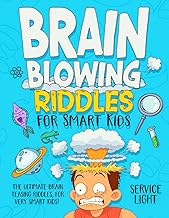Sharpen Your Mind: Dive into These Brain-Teasing IQ Puzzles & Boost Your Brainpower
In our fast-paced world, keeping our minds sharp is more important than ever. While physical exercise keeps our bodies fit, our brains also need a regular workout to stay agile, focused, and resilient. Enter brain-teasing IQ puzzles – a fun, engaging, and highly effective way to challenge your cognitive abilities.
This article will explore the incredible benefits of these mental gymnastics, delve into various types of puzzles, and provide actionable tips to integrate them into your daily routine. Get ready to unlock your brain’s full potential!
Why Bother with Brain Teasers? The Cognitive Benefits
Engaging with IQ puzzles isn’t just a pastime; it’s a strategic investment in your mental well-being and performance. Here’s how they can transform your mind:
Boost Problem-Solving Skills
- Enhance Analytical Thinking: Puzzles often require breaking down complex problems into smaller, manageable parts.
- Improve Critical Thinking: You’ll learn to evaluate information, identify patterns, and make logical deductions more effectively.
- Develop Strategic Planning: Many puzzles demand foresight and planning several steps ahead.
Enhance Memory & Concentration
- Working Memory: Holding multiple pieces of information in your mind simultaneously, crucial for solving intricate puzzles.
- Focus & Attention Span: Concentrating on a puzzle for an extended period trains your brain to ignore distractions.
- Recall: Retrieving relevant information and rules from memory to apply to new situations.
Foster Creativity & Lateral Thinking
Some puzzles demand you think outside the box, approaching problems from unconventional angles. This cultivates lateral thinking – the ability to solve problems through an indirect and creative approach, using reasoning that is not immediately obvious.
Reduce Stress & Improve Mood
The immersive nature of puzzles can be a fantastic way to de-stress. Focusing on a challenge provides a welcome distraction from daily worries, and the satisfaction of solving a difficult puzzle releases dopamine, boosting your mood and sense of accomplishment.
Support Long-Term Brain Health
Regular mental stimulation, like solving puzzles, is linked to a reduced risk of cognitive decline as we age. It helps build cognitive reserve, making your brain more resilient against age-related changes.
Types of Brain-Teasing IQ Puzzles to Explore
The world of brain teasers is vast and varied, offering something for every preference. Here are some popular categories:
Logic Puzzles & Deductive Reasoning
- Sudoku: Fill a 9×9 grid with digits so that each column, each row, and each of the nine 3×3 subgrids contains all of the digits from 1 to 9.
- Nonograms (Picross): Use numerical clues to reveal a hidden pixel image on a grid.
- Einstein’s Riddle (Zebra Puzzle): A classic deduction puzzle where you use a series of clues to match items to different people or objects.
Riddles & Wordplay
- Classic Riddles: Short questions or statements that require clever, often metaphorical, answers. (e.g., “What has an eye but cannot see?”)
- Anagrams: Rearranging the letters of a word or phrase to form a new word or phrase.
- Crosswords: Using definitions to fill in words on a grid.
Math & Number Puzzles
- KenKen: A grid-based arithmetic and logic puzzle, similar to Sudoku, but involves mathematical operations.
- Cryptarithmetic: Replacing digits with letters in a mathematical equation, where each letter represents a unique digit. (e.g., SEND + MORE = MONEY)
- Magic Squares: Arranging numbers in a square grid so that the sum of each row, column, and main diagonal is the same.
Visual & Spatial Reasoning Puzzles
- Tangrams: Arranging seven flat shapes (tans) to form specific designs without overlapping.
- Spot the Difference: Identifying subtle variations between two seemingly identical images.
- Spatial Rotation Puzzles: Mentally rotating 3D objects or shapes to match a target orientation.
- Mazes: Finding the correct path through a complex network.
Critical Thinking & Scenario Puzzles
- River Crossing Puzzles: Involving transporting items or people across a river with specific constraints.
- Lateral Thinking Puzzles: Often short scenarios that require you to ask “yes” or “no” questions to uncover the full story.
Practical Tips for Integrating Puzzles into Your Routine
Ready to make brain teasers a regular part of your life? Here’s how to start:
- Start Small & Be Patient: Don’t jump into the hardest puzzles immediately. Begin with easier ones to build confidence and gradually increase the difficulty.
- Make It a Daily Habit: Dedicate 10-15 minutes each day to a puzzle, perhaps during your morning coffee, commute, or before bed. Consistency is key.
- Vary Your Puzzles: Challenge different areas of your brain by rotating through different types of puzzles. Don’t just stick to Sudoku!
- Don’t Be Afraid to Look Up Answers: If you’re truly stuck, a hint or even the solution can be a learning opportunity. Analyze *why* that was the answer.
- Challenge Friends or Family: Make it a social activity. Collaborative problem-solving can be even more rewarding.
- Utilize Both Digital & Physical Resources: Apps, websites, puzzle books, and even daily newspaper sections offer endless options.
- Track Your Progress (Optional): For some puzzles, tracking your completion time or accuracy can motivate you to improve.
Are IQ Puzzles Truly an “IQ Test”? Understanding the Nuance
While brain-teasing puzzles are excellent for developing cognitive skills, it’s important to understand they are not direct substitutes for standardized IQ tests. Formal IQ tests are scientifically designed assessments that measure various aspects of intelligence (verbal comprehension, perceptual reasoning, working memory, processing speed) in a highly structured and normed environment.
However, the skills honed by regularly engaging with brain teasers – such as logical reasoning, pattern recognition, and problem-solving – are precisely the abilities that contribute to a higher IQ score. So, while solving a Sudoku won’t give you an IQ number, it will undoubtedly strengthen the underlying cognitive muscles that such tests measure.
In conclusion, diving into brain-teasing IQ puzzles is far more than just a pastime; it’s a powerful and enjoyable way to invest in your cognitive health and mental agility. From boosting your problem-solving capabilities to enhancing memory and fostering creativity, the benefits are clear and profound.
So, why wait? Pick a puzzle, challenge your mind, and embark on a rewarding journey to a sharper, more resilient you. Your brain will thank you!
Related Amazon Products

200 Cryptograms Large Print: Fun Brain Teasing Cryptograms to Keep You Sharp (Increase Brain Function and IQ)

Brain Blowing Riddles for Smart Kids: The Ultimate Brain Teasing Riddles for Smart Kids!
As an Amazon Associate I earn from qualifying purchases.








